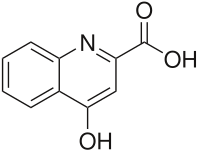
Photo from wikipedia
Compared to females, male COVID-19 patients have more kynurenic acid, which may underlie their poorer immune response. Sex-specific metabolism and COVID-19 Males and females have different immune responses to SARS-CoV-2… Click to show full abstract
Compared to females, male COVID-19 patients have more kynurenic acid, which may underlie their poorer immune response. Sex-specific metabolism and COVID-19 Males and females have different immune responses to SARS-CoV-2 infection, with male sex being a risk factor for mortality, particularly among older individuals. Cai et al. performed metabolomics analysis of serum from COVID-19 patients and uninfected health care workers and identified 17 metabolites that were associated with the disease. However, in male COVID-19 patients only, the amount of the tryptophan metabolite kynurenic acid (KA) correlated with age, inflammation, and disease outcome. KA inhibits glutamate release, and glutamate abundance was reduced in patients who deteriorated. Together, these findings indicate that KA is associated with sex-specific differences in immune responses to COVID-19, suggesting that it might be targeted in male patients. Coronavirus disease 2019 (COVID-19) has poorer clinical outcomes in males than in females, and immune responses underlie these sex-related differences. Because immune responses are, in part, regulated by metabolites, we examined the serum metabolomes of COVID-19 patients. In male patients, kynurenic acid (KA) and a high KA–to–kynurenine (K) ratio (KA:K) positively correlated with age and with inflammatory cytokines and chemokines and negatively correlated with T cell responses. Males that clinically deteriorated had a higher KA:K than those that stabilized. KA inhibits glutamate release, and glutamate abundance was lower in patients that clinically deteriorated and correlated with immune responses. Analysis of data from the Genotype-Tissue Expression (GTEx) project revealed that the expression of the gene encoding the enzyme that produces KA, kynurenine aminotransferase, correlated with cytokine abundance and activation of immune responses in older males. This study reveals that KA has a sex-specific link to immune responses and clinical outcomes in COVID-19, suggesting a positive feedback between metabolites and immune responses in males.
Journal Title: Science Signaling
Year Published: 2021
Link to full text (if available)
Share on Social Media: Sign Up to like & get
recommendations!